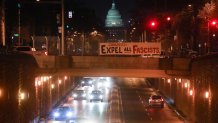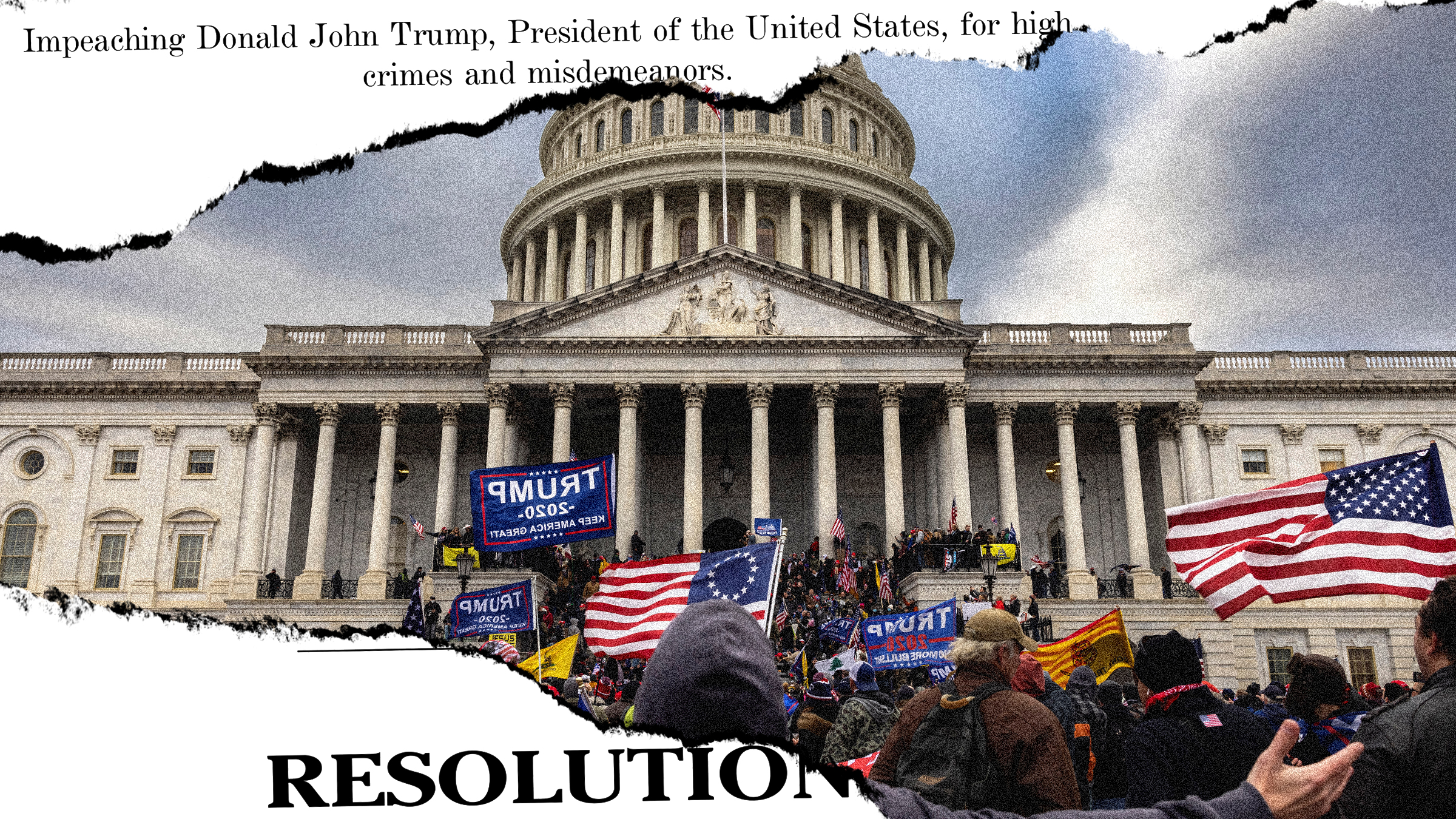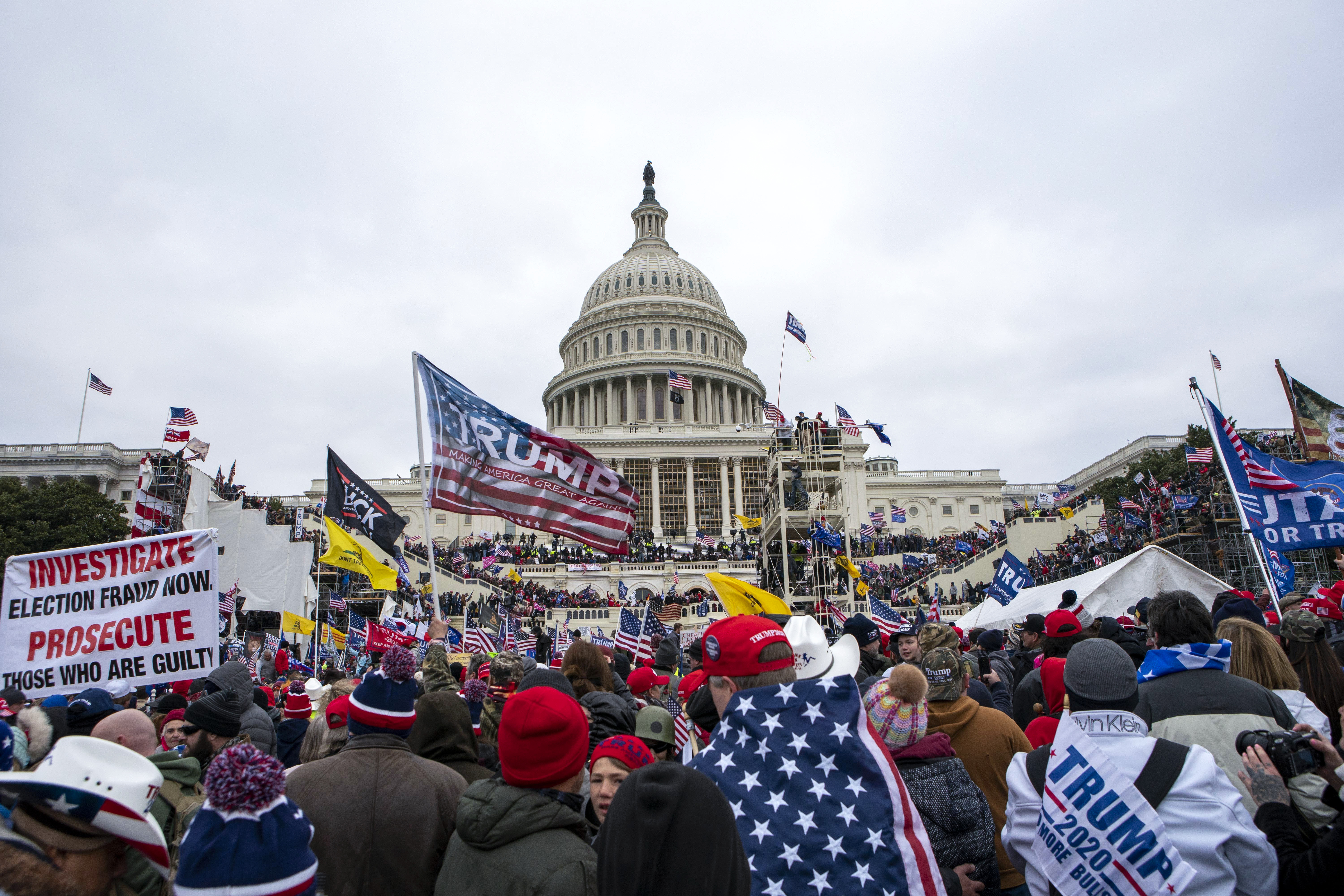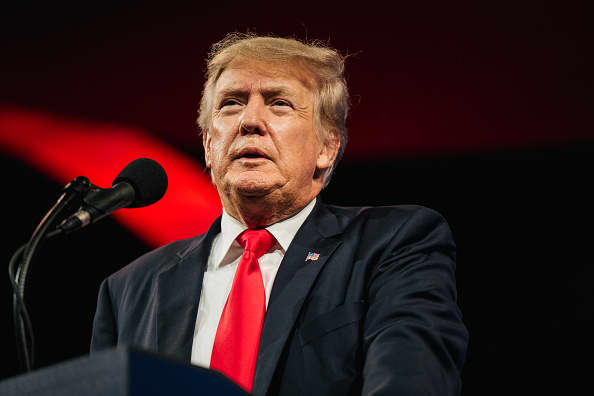One year after supporters of former President Donald Trump stormed into the U.S. Capitol building, D.C. residents and other Americans are reflecting on those deadly, traumatic hours when the nation’s democracy felt imminently imperiled.
President Joe Biden and Vice President Kamala Harris delivered remarks from the U.S. Capitol, and the U.S. House held a prayer service and moment of silence. The public also participated in various vigils in the nation's capital.
Members of Congress fled the House floor as rioters invaded the Capitol a year ago, interrupting the certification of Biden and Harris’ electoral victory. On Thursday, some returned to reflect and say the Pledge of Allegiance.
Speaker Nancy Pelosi spoke on the heroism of police officers who responded that day. She dedicated a moment of silence to four law enforcement officers who she called “our fallen heroes of that day”: Brian Sicknick, who collapsed and died on Jan. 7; Howard Liebengood and Jeffrey Smith, who died by suicide in the days after the attack; and Billy Evans, a Capitol Police officer killed in an April attack.
We've got the news you need to know to start your day. Sign up for the First & 4Most morning newsletter — delivered to your inbox daily. >Sign up here.
D.C. Mayor Muriel Bowser said she wants increased security measures when there are joint sessions of Congress, plus renewed her call for D.C. statehood and for control of the D.C. National Guard to be given over to the District's mayor.
Bowser and Metropolitan Police Chief Robert Contee both praised D.C. police officers for helping restore order at the Capitol and raised concerns that the District would be vulnerable during future periods between elections and inaugurations.
“We must do more to protect the peaceful transfer of power,” Bowser said.
President Biden, VP Harris Warn of Threats to Democracy
In remarks from Statuary Hall in Congress, which a year ago was packed with rioters carrying Trump flags, President Biden warned of threats to American democracy.
"I did not seek this fight, brought to this Capitol one year ago today, but I will not shrink from it either. I will stand in this breach. I will defend this nation," he said.
Biden blamed Trump without speaking his name, saying the former president lied and incited a "violent mob" to prevent a peaceful transfer of power after losing an election.
“Bruised ego matters more to him than our democracy or our Constitution,” Biden said. “He's not just the former president. He's a defeated former president, defeated by a margin of over 7 million of your votes.”
Biden called the 2020 election "the greatest demonstration of democracy in this country."
“The pain and scars from that day run deep. Said many times it’s no more true or real,” Biden said. “At this moment we must decide what kind of nation we are going to be. Are we going to be a nation that accepts political violence as a norm?”
Vice President Kamala Harris recalled her staff members who used filing cabinets to barricade themselves in an office on Jan. 6, and hailed the heroism of those who responded that day from Capitol Police, the Metropolitan Police Department, the National Guard and other agencies.
“Jan. 6 reflects the dual nature of democracy, its fragility and strength,” Harris said.
Harris said the American spirit is being tested, and echoed language from the Constitution in speaking about continued threats to democracy and voting rights.
"We must unite in defense of our democracy in order to form a more perfect union, establish justice, ensure domestic tranquility provide a common practice to promote the general welfare and secure the blessings of liberty, ourselves and posterity," Harris said.
Remembrance events during the day will be widely attended by Democrats, in person and virtually, but almost every Republican on Capitol Hill will be absent. While congressional Republicans almost universally condemned the attack in the days afterward, most have stayed loyal to the former president.
Impact of Jan. 6 on D.C. and Washingtonians
On the eve of Jan. 6, activists said they projected messages on the National Gallery of Art and hung a banner on a bridge with the Capitol in the background. ShutDownDC says their messages took aim at lawmakers who repeated unfounded claims of fraud in the 2020 election.

People who live and work near the U.S. Capitol told News4 that they're still shaken by what happened.
"It certainly is a haunting memory," said Laura Kells, who works near the Capitol. "I never would have imagined such a thing could have happened. I mean, I work here. I walk by it every day. I see the Capitol Police all the time."
New U.S. Capitol Police Chief Thomas Manger told Congress that he has a 25-page plan to secure the Capitol Thursday as lawmakers mark the anniversary. He told Congress in testimony this week that the force is stronger and better equipped to handle an attack against the Capitol or lawmakers than it was a year ago.
“If Jan. 6 taught us anything, it's that preparation matters,” Manger said.
D.C. Police Chief Robert Contee said his department will be ready for any demonstrations, but he had not yet requested assistance from outside police agencies or the National Guard.
What Happened on Jan. 6 at the Capitol
Jan. 6 rioters, many carrying Trump flags or wearing "Make America Great Again" gear, descended on the Capitol after a rally where the president repeated bogus claims of fraud in the 2020 election. Trump told the crowd to go to the Capitol and "fight like hell."
At the Capitol, a mob overwhelmed Capitol Police lines, charged up the steps and busted through windows. Hundreds flooded into the building. Some chanted the name of then-Vice President Mike Pence, evidently egged on by Trump's statements that Pence could stop Congress from certifying and reaffirming Joe Biden's electoral victory.
Four people died at the Capitol on Jan. 6, 2021, including Trump supporter Ashli Babbit, who was fatally shot while breaking into the House chamber. U.S. Capitol Police Officer Brian Sicknick died the following day. Several officers who responded to the Capitol died by suicide in the aftermath.
Violent confrontations between officers and rioters — which 18-year Capitol Police veteran Brian Fanone described as “brutal, medieval-style combat” — injured dozens of officers.
Jan. 6, 2021 was instantly burned into history books. The National Museum of American History has collected artifacts from the insurrection, including a protective vest worn by a journalist and signs from Trump supporters. Currently, there's no plan to display those items.
In the year since smashed windows have been replaced. An “unscalable” fence around the People’s House is long gone, giving D.C. residents and visitors free access to the grounds.
Insurrection Aftermath
The fallout of the Capitol insurrection is still unfolding.
Many emergency responders still carry heavy mental and emotional burdens.
“The physical injuries suffered that day may heal, but the emotional and psychological trauma inflicted will not soon disappear,” a report by U.S. Capitol Police said.
U.S. Capitol Police Officer Harry Dunn told News4 that the trauma has stayed with him for a year and changed him.
"There were times when I would eat lunch in my car just because I didn't want to be around people, and I would just isolate myself,” he said. “There were times that I would just, I would just cry. I’d physically cry and just say, ‘Why the hell am I doing this? Is this even worth it?’”
Hill staffers say life has changed in the wake of the Jan. 6 attack — months marked by a series of security alerts, evacuations and exponential growth in threats against lawmakers, all on top of a grueling pandemic.
House staffer Renata Beca-Barragan has keeps a pair of sneakers at the office. Just in case. Three of the four staffers interviewed by the I-Team say they know at least one person who left the Hill in part or because of the January violence.
There are unanswered questions and stubborn mysteries. Who planted two pipe bombs the night before the insurrection? Who set up gallows and a noose outside the Capitol? And whose idea, if anyone’s, was it to breach police lines and try to hunt down legislators?
Mayor Bowser said the pipe bombs were an early indication of the violence.
“This was one of the key pieces that kicked off everything that happened on Jan. 6," police chief Contee said Thursday.
Prosecutors say some answers could emerge from the courts. Capitol riot cases have more than 700 defendants and counting. At least 71 people have been sentenced for riot-related crimes, with 31 sentenced to imprisonment or jail time.
On Thursday, a far-right group planned a candlelight vigil outside the Central Detention Facility in Southeast D.C. in support of some of the people arrested in the riot.
This year is expected to bring some of the higher-profile cases, including former New York police officer Thomas Webster. Video used by prosecutors in court allegedly shows Webster assaulting a Capitol officer. He has pleaded not guilty.
He’s not the only defendant with ties to law enforcement.
Also charged: two former Virginia officers from Rocky Mount, a Chicago officer who’s now on a leave of absence, and a DEA agent who allegedly showed his badge and gun while on the Hill. All of them have pleaded not guilty. All but one have been released until their trials.
The spring will also likely bring some of the first trials involving accused members of groups such as the Oath Keepers and Proud Boys where we’ll get a glimpse of what their defenses will be.
“The courts have never seen this number of cases in one year in the District. So, 700 plus cases in D.C. is twice as many as they usually have, which means that there's a strain on prosecutors and a strain on defense attorneys," said Seamus Hughes, deputy director of the Program on Extremism at The George Washington University.
If you or someone you know is at risk of suicide please call the U.S. National Suicide Prevention Lifeline at 800-273-8255, text TALK to 741741 or go to SpeakingOfSuicide.com/resources for additional resources.




